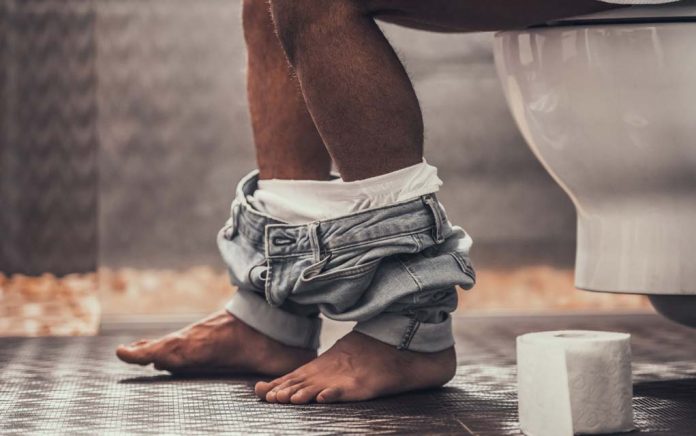
Hemorrhoids (piles) are distended or ruptured veins located within the anus (internal hemorrhoids) or just outside the anus (external hemorrhoids). At least half the North American population suffers from the problem at least once during their lifetime. Hemorrhoids are similar to varicose veins found on the legs, and they can be just as painful, itchy, and unsightly. They are caused by anything that increases pressure in the pelvic veins for prolonged periods of time.
The commonest cause of hemorrhoids is constipation. Dr. Dennis Burkitt and many other experts have noted the inverse relationship between the frequency and size of bowel movements and good health. This is most true for hemorrhoids.
Dr. Dennis found that citizens of those cultures that had larger, softer, and more frequent bowel movements were also the healthiest. Furthermore, these groups had the smallest and fewest hospitals. They ate a primarily vegetarian diet, with animal products used only as flavorings or for an occasional feast. Individuals also had a bowel movement following each meal.
Other things associated with hemorrhoids include:
• Heredity
• Pregnancy
• Prostate enlargement
• Obesity
• Straining at stool
• Diarrhea
• Improper or heavy lifting
• Sedentary lifestyle
• Standing for long periods of time
• Sitting on cold, hard surfaces
• Severe coughing
• Liver disease (cirrhosis)
• Food allergies
• Alcohol or drug abuse
• Anal intercourse
Hemorrhoids may itch, bleed, tear, and cause pain. They can usually be treated naturally but severe cases may require surgery.
Diet
• From a diet standpoint, it is very important to increase fluids.
• A high-fiber, high-complex carbohydrate diet is recommended.
• Avoid animal products as much as possible.
• Avoid coffee, spicy foods, fried foods, alcohol, hot sauces, fatty foods, salty foods, sugar, and refined carbohydrates.
• Eat more cranberries, water chestnuts, buckwheat, tangerines, figs, plums, prunes, guavas, bamboo shoots, mung beans, melons, black sesame seeds, persimmons, bananas, squash, cucumbers, tofu, blueberries, blackberries, and cherries.
• Fresh juices that may be therapeutic include carrot, spinach, potato, turnip, watercress, celery, and parsley.
• Flax seed oil (1-2 tablespoons daily) creates a natural lubricating effect by softening stools.
Candida
Itchiness from hemorrhoids is usually caused by yeast or candida overgrowth and their mycotoxins. A daily supplement of a good Lactobacillus acidophilus supplement helps crowd out the fungi and eventually the itching stops.
To prevent fungal infection, avoid foods high in sugar (including fruit and fruit juice); fermented foods such as beer, wine, cheese, bread, and stored grains; grain-fed animal products (red meats, especially beef and pork, animal fats, butter, whole milk and other high-fat dairy products); nuts (especially peanuts, cashews, pistachios) and seeds; and refined foods. Avoid leftovers and tobacco products.
Eat more fish and fish oils, garlic, onions, olives, olive oil, green vegetables, herbs, tofu and other soy products, yogurt, psyllium, pectin, and milled (ground) flax seed. An increased intake of fiber significantly reduces the impact of mycotoxins.
Herbal Remedies
• Horse chestnut extract is probably the most effective herbal remedy used traditionally to treat varicose veins and hemorrhoids. The major active ingredient is believed to be aescin, which stops swelling and inflammation without any side effects. Horse chestnut extract (standardized to 50 mg of aescin) swallowed 3 or 4 times daily also prevents bleeding from hemorrhoids by decreasing capillary and vein permeability (leakiness).
• Other topical herbal remedies which may be very soothing are aloe vera and calendula.
• Herbs that may be helpful in an oral supplement form are psyllium seed husks and powder, chamomile, buckthorn, collinsonia root, and elderberry.
Nutritional Supplements
Dosages for all supplements would, of course, have to be individualized. Supervision by a naturopath or medical doctor familiar with vitamins, minerals and herbs is ideal. Supplemental nutrients that are often prescribed to help shrink hemorrhoidal tissue and promote healing are:
• Vitamin A: 10,000 mg daily
• Beta-carotene: 10,000 mg daily
• Vitamin B complex: 50 mg 3 times daily
• Vitamin C: 3000-6000 mg daily
• Vitamin E: 800 I.U. daily
• Selenium: 200 mcg daily
• Zinc chelate: 50 mg daily
• Bioflavonoids (rutin, hesperidin): 1000 mg daily
Bioflavonoids strengthen capillaries and are also one of the many nutrients that help lessen the effects of food allergies.
• Pycnogenol or grape seed extract: 300 mg daily
• Coenzyme Q10: 200 mg daily
For bleeding hemorrhoids, supplementation with vitamin K may be necessary. To get adequate amounts of vitamin K from the diet, eat more dark green leafy vegetables such as spinach, alfalfa, kale, and lettuce.
Lifestyle
• Avoid cigarette smoking and sedentary behavior because both habits make hemorrhoids worse.
External Relief
• Fast-relieving topical remedies that you can experiment with are: tea tree oil, aloe vera gel, garlic oil, oregano oil, olive oil, flax seed oil and calendula cream.
• A garlic clove or raw potato can be made into a soothing rectal suppository if one is so inclined.
• Mineral (sitz) baths using epsom salts on a daily basis are also quite helpful.
• Different things will work better for given individuals.
Dr. Zoltan Rona










